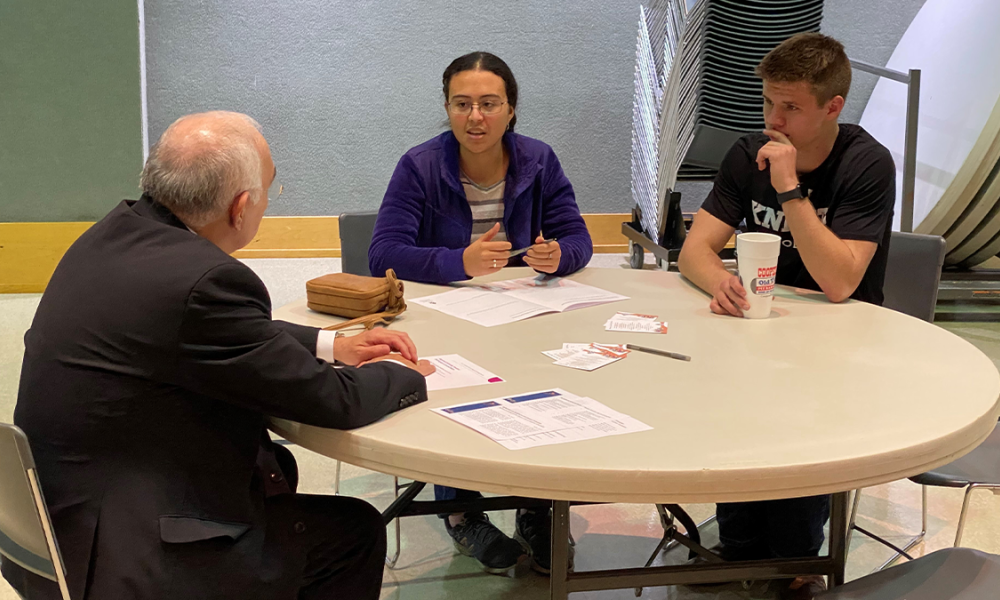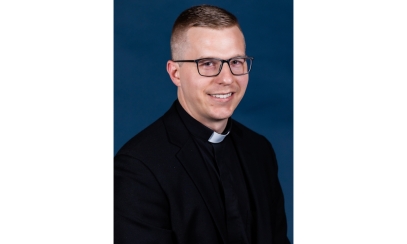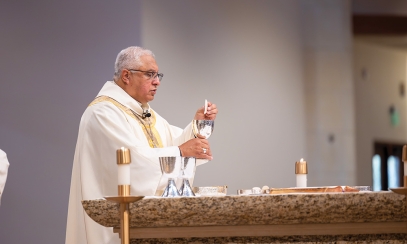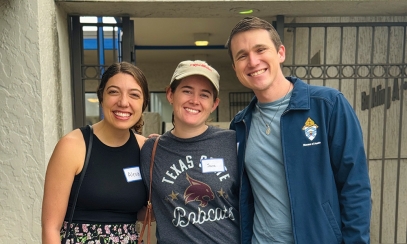
Bishop’s Interview
The Synod: Recognizing the Holy Spirit in the Voices of Our People
The Synod: Recognizing the Holy Spirit in the Voices of Our People
Editor: Bishop, the synodal process has completed in the Diocese of Austin. Will you remind us what this latest synod is all about?
Bishop Vásquez: The Synod on Synodality is a two-year process of listening and dialogue, which Pope Francis formally opened last October with the theme “For a synodal church: communion, participation and mission.” This process of listening for the Holy Spirit as we listen to one another and journey together has included several listening sessions held around the diocese and a survey that was available for people to take.
When the Holy Spirit descended on the disciples at Pentecost, the church was born. The primary operating agent of the church is the Holy Spirit, and through the synodal process, we call upon the Holy Spirit to guide our hearts. It is the Spirit that guides the church and leads the church, always looking to the day Christ will return.
From the very beginning, the church has been synodal. Throughout the church’s history, there have been periods where the church takes the time to gather and discuss the important issues of the day and address concerns that need to be corrected or strengthened. When this synod was initiated last year, some raised concern that the goal of the synod was to change church doctrine or church teaching. However, this synod seeks to assess how the church listens to all of people of God. This synod is about drawing the voices of the Christian faithful into her prayer and her mission at every level. Through the diocesan synodal process, I hope people have come to know that they are being listened to and that the Holy Spirit is at work.
Editor: You participated in all five regional listening sessions. What struck you during the sessions?
Bishop Vásquez: At each of the listening sessions, I welcomed everyone, led the group in prayer, and then I listened. I found the discussion at each of the session to be very enlightening and hopeful. I think sometimes we bishops are known for talking and not listening, but the synodal process gave me the opportunity to step back and be with the people. I found the process to be very reassuring, and I enjoyed the time I shared with the people of our diocese.
Editor: What were some of the main takeaways for you?
Bishop Vásquez: I was amazed how many people said, “The church has never asked me my opinion on what’s going on in the church.” Many of the questions posed revolved around hospitality, the Eucharist, the Word of God, listening, speaking out and sharing responsibility for our common mission and discernment. Some of the people have been members of the church for many years, and they considered it a privilege to be asked what they think about these different aspects of our church.
Others expressed their opinions about the way the church relates to certain groups or certain aspects of church tradition. Many also expressed their concerns about the future of the church. More than one parent expressed their concern for their children who no longer practice the faith. These discussions and conversations were candid and honest. I am so grateful to the people who expressed their concerns and shared their thoughts through the survey and the listening sessions. As I listened, it was obvious to me the Holy Spirit is working and is speaking through our people.
Editor: What, in your opinion, is the strongest call that the synodal process has made to our local church?
Bishop Vásquez: I think this process has awakened in people a spirit of willingness to get involved in the church. We cannot sit back and be spectators in the church; as disciples we are called to speak, act and serve in the church. Our parishes have so many ministries and ways to get involved, and I encourage all of us to find ways to actively participate. As Christians, we form the mystical body of Christ. Therefore, we must pay attention to and listen to one another. An important aspect of being church is how we respond to those who feel distanced and marginalized.
Editor: What is the next step in the synodal process?
Bishop Vásquez: At the diocesan level, we have synthesized the survey results and the information that was shared at the listening sessions and that document will be sent to the U.S. Conference of Catholic Bishops. The USCCB will compile and synthesize the information from the dioceses in the U.S., then send that information on to the continental phase. The process will culminate with the Synod of Bishops in October 2023.
Editor: What is your prayer for us as we go forward, and the synod process goes to the Vatican?
Bishop Vásquez: As the great feast of Pentecost approaches, I pray God the Father will once again pour out an abundance of the Holy Spirit on all the members of our church, so that we may be inspired to proclaim Jesus Christ boldly in our homes, families, parishes and communities. May the Spirit send us forth to restore unity, peace and justice in our world. Amen.



